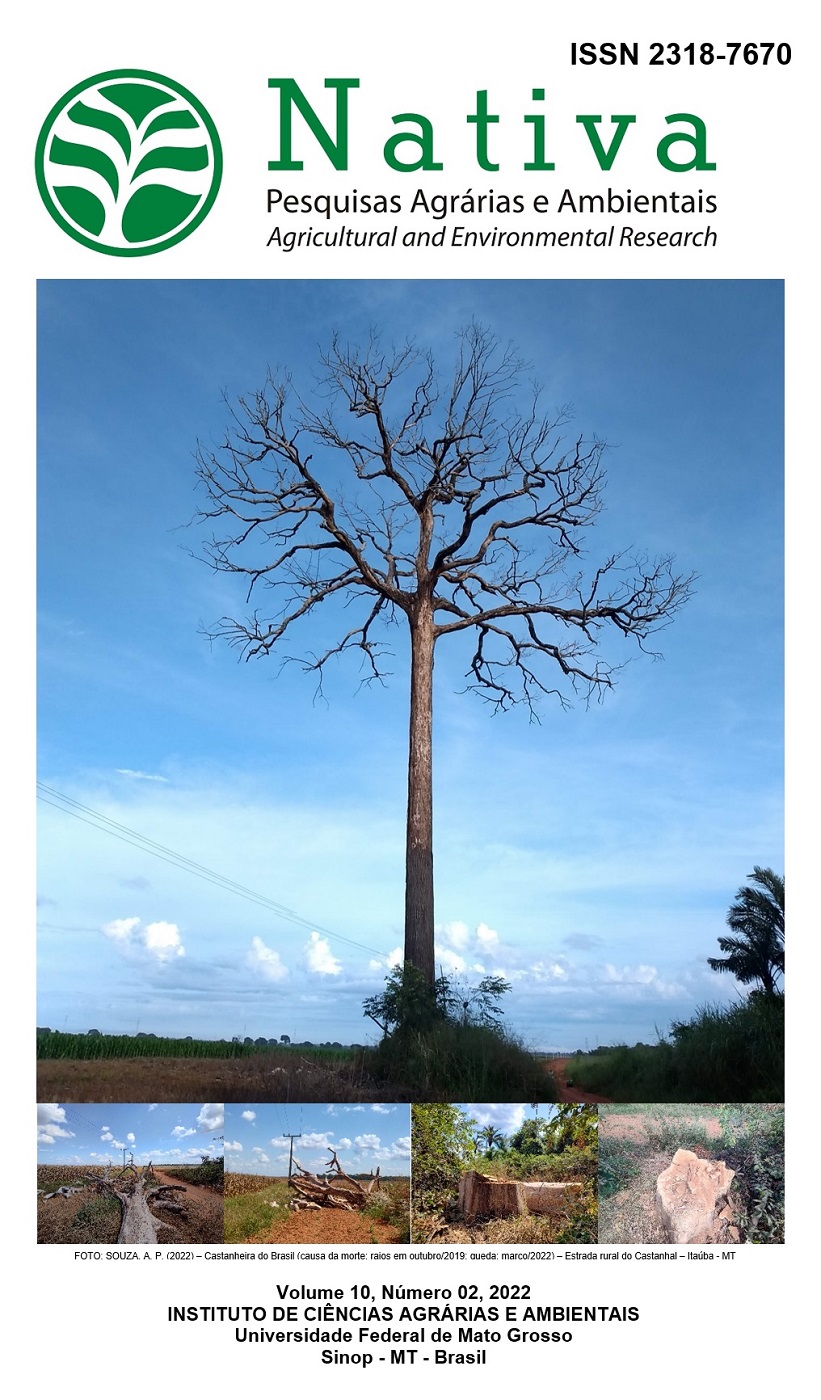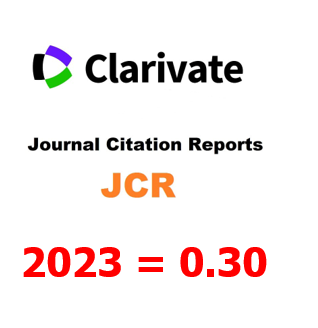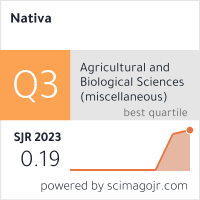PAGAMENTOS POR SERVIÇOS AMBIENTAIS E ECOSSISTÊMICOS PARA PRODUÇÃO DE ÁGUA
DOI:
https://doi.org/10.31413/nativa.v10i2.12791Palavras-chave:
revisão sistemática, bioeconomia, recursos hídricos, desenvolvimento agrícola, preservação ambientalResumo
Os Pagamentos por Serviços Ambientais (PSA), são um tema em ascensão na academia e nas formulações de políticas públicas, em nível global. Isso dá ao tema, além da notoriedade, à necessidade de esboçar o seu estado da arte e assim alinhar as discussões mundiais aos cenários locais. O objetivo desse estudo foi realizar uma Revisão Sistemática sobre os PSA, em específico os relacionados a Produção de Água (PSA – Água). Foi realizado um Science Mapping, que partiu de um protocolo pesquisa em artigos internacionais, de acesso aberto, disponíveis na base de dados Scopus e Web of Science, em um recorte de cinco anos. Os dados foram tratados no R Studio®, Excel® e no Biblioshiny®. Foram selecionados 208 artigos, submetidos aos critérios de exclusão do Methodi Ordinatio Modificado. Já a análise de conteúdo se valeu dos 21 artigos mais relevantes para essa pesquisa. Os resultados demonstraram que os temas Serviços Ambientais e Ecossistêmicos, atualmente tem tido muito destaque nas discussões. Por fim, pode-se concluir que apesar da heterogeneidade das pesquisas, o consenso está relacionado a preocupação global com o uso e preservação dos recursos hídricos e que os programas de PSA – Água, mesmo com muitos desafios, estão beneficiando diversas comunidades locais.
Palavras-chave: revisão sistemática; bioeconomia; recursos hídricos; desenvolvimento agrícola; preservação ambiental.
Payments for environmental and ecosystem services for water production
ABSTRACT: Payments for Environmental Services (PES) are a rising topic in academia and in policymaking at a global level. This gives the theme, in addition to notoriety, the need to outline its state of the art and, thus, align global discussions with local scenarios. The objective of this study was to carry out a Systematic Review on PSA, specifically those related to Water Production (PSA - Water). A Scientific Mapping was carried out, based on a research protocol in international, open access articles, available in the Scopus and Web of Science databases, over a period of five years. Data were processed in R Studio®, Excel® and Biblioshiny®. A total of 208 articles were selected, submitted to the exclusion criteria of the Modified Methodi Ordinatio. Content analysis used the 21 most relevant articles for this research. The results showed that the themes Environmental Services and Ecosystem Services, currently, have had a lot of prominence in the discussions. Finally, it can be concluded that despite the heterogeneity of the research, the consensus is related to the global concern with the use and preservation of water resources and that the PES - Water programs, even with many challenges, are benefiting several local communities.
Keywords: systematic review; bioeconomy; water resources; agricultural development; environmental preservation.
Referências
ADAMOWICZ, W.; CALDERON-ETTER, L.; ENTEM, A.; FENICHEL, E. P.; HALL, J. S.; LLOYD-SMITH, P.; OGDEN, F. L.; REGINA, J. A.; RAD, M. R.; STALLARD, R. F. Assessing ecological infrastructure investments. Proceedings of the National Academy of Sciences, v. 116, n. 12, p. 5254-5261. 2019. DOI: https://doi.org/10.1073/pnas.1802883116
AGUILAR, F. X.; OBENG, E. A.; CAI, Z. Water quality improvements elicit consistent willingness-to-pay for the enhancement of forested watershed ecosystem services. Ecosystem Services, v. 30, p. 158-171, 2018. DOI: https://doi.org/10.1016/j.ecoser.2018.02.012
ALBUQUERQUE, B. Brasil passa pela maior crise hídrica desde 1931. PODER360. 2021. Disponível em: <https://www.poder360.com.br/governo/brasil-passa-pela-maior-crise-hidrica-desde-1931-diz-bento-albuquerque/>. Acesso em: 20 jun 2021.
ANA_Agência Nacional de Águas. Conjuntura dos recursos hídricos no Brasil 2019: informe anual/Agência Nacional de Águas. Brasília: ANA, 2019. 110p.
ANZALDI, G. A holistic ICT solution to improve matching between supply and demand over the water supply distribution chain. Journal of Sustainable Development of Energy, Water and Environment Systems, v. 2, n. 4, p. 362-375, 2014. DOI: http://dx.doi.org/10.13044/j.sdewes.2014.02.0029
ASBJORNSEN, H.; MANSON, R. H.; SCULLION, J. J.; HOLWERDA, F.; MUÑOZ-VILLERS, L. E.; ALVARADO-BARRIENTOS, M. S.; GEISSERT, D.; DAWSON, T. E.; MCDONNELL, J. J.; BRUIJNZEEL, L. A. Interactions between payments for hydrologic services, landowner decisions, and ecohydrological consequences: synergies and disconnection in the cloud forest zone of central Veracruz, Mexico. Ecology and Society, v. 22, n. 2, 2017, DOI: https://doi.org/10.5751/ES-09144-220225
BARDIN, L. Análise de Conteúdo. São Paulo, Edições. 2011. 229p.
BLADON, A. J.; SHORT, K. M.; MOHAMMED, E. Y.; MILNER-GULLAND, E. J. Payments for ecosystem services in developing world fisheries. Fish and Fisheries, v. 17, n. 3, p. 839-859, 2016. DOI: https://doi.org/10.1111/faf.12095
BOTTAZZI, P.; WIIK, E.; CRESPO, D.; JONES, J. P. G. Payment for environmental “self-service”: Exploring the links between Farmers' motivation and additionality in a conservation incentive programme in the Bolivian Andes. Ecological Economics, v. 150, p. 11-23, 2018. DOI: https://doi.org/10.1016/j.ecolecon.2018.03.032
BRASIL. Lei nº 14.119, de 13 de janeiro de 2021: Institui a Política Nacional de Pagamento por Serviços Ambientais; e altera as Leis n° 8.212, de 24 de julho de 1991, 8.629, de 25 de fevereiro de 1993, e 6.015, de 31 de dezembro de 1973, para adequá-las à nova política. DOU. 2021
BREMER, L. L.; FARLEY, K. A.; CHADWICK, O. A.; HARDEN, C. P. Changes in carbon storage with land management promoted by payment for ecosystem ser Bremer ices. Environmental Conservation, v. 43, n. 4, p. 397-406, 2016. DOI: https://doi.org/10.1017/S0376892916000199
CHIODI, R. E.; MARQUES, P. E. M. Políticas públicas de Pagamento por Serviços Ambientais para a conservação dos recursos hídricos: origens, atores, interesses e resultados da ação institucional. Desenvolvimento e Meio Ambiente, v. 45, p. 81-104, 2018, DOI: http://dx.doi.org/10.5380/dma.v45i0.48757
CHOI, I. C.; SHIN, H.; NGUYEN, T. T.; TENHUNEN, J.
Water policy reforms in South Korea: A historical review and ongoing challenges for sustainable water governance and management. Water, v. 9, n. 9, p. 717-739, 2017. DOI: https://doi.org/10.3390/w9090717
CRESWELL, J. W. Investigação Qualitativa e Projeto de Pesquisa: Escolhendo entre Cinco Abordagens. Porto Alegre: Penso Editora, 2014. 342p.
DEL ROSSI, G.; HECHT, J. S.; ZIA, A. A mixed-methods analysis for improving farmer participation in agri-environmental payments for ecosystem services in Vermont, USA. Ecosystem Services, v. 47, e101223, 2021. https://doi.org/10.1016/j.ecoser.2020.101223
DEL VECCHIO, K.; BARONE, S. Has Morocco’s groundwater policy changed? Lessons from the institutional approach. Water alternatives, v. 11, n. 3, p. 638-662, 2018. ISSN: https://hal.archives-ouvertes.fr/halshs-01891804/
DESTA, H.; LEMMA, B. SWAT based hydrological assessment and characterization of Lake Ziway sub-watersheds, Ethiopia. Journal of Hydrology: Regional Studies, v. 13, p. 122-137, 2017. DOI: https://doi.org/10.1016/j.ejrh.2017.08.002
ERCOLE, F. F.; MELO, L. S.; ALCOFORADO, C. L. G. C. Revisão integrativa versus revisão sistemática. Revista Mineira de Enfermagem, v. 18, n. 1, p. 9-12, 2014. http://www.dx.doi.org/10.5935/1415-2762.20140001
FOVARGUE, R. E; REZAPOUR, S; ROSENDAHL, D; WOOTTEN, A. M; SABZI, H. Z; MORENO, H. A; NEESON, T. M. Spatial planning for water sustainability projects under climate uncertainty: balancing human and environmental water needs. Environmental Research Letters, v. 16, n. 3, e034050, 2021. DOI: https://doi.org/10.1088/1748-9326/abdd58
GARCIA, A.; HIPEL, K.; OBEIDI, A. Water pricing conflict in British Columbia. Hydrological Research Letters, v. 11, n. 4, p. 194-200, 2017. DOI: https://doi.org/10.3178/hrl.11.194
GARCIA‐PRATS, A.; DEL CAMPO, A. D.; PULIDO‐VELAZQUEZ, M. A hydroeconomic modeling framework for optimal integrated management of forest and water. Water Resources Research, v. 52, n. 10, p. 8277-8294, 2016. DOI: https://doi.org/10.1002/2015WR018273
IGARASHI, W.; IGARASHI, D. C. C.; BORGES, B. J. Revisão sistemática e sua potencial contribuição em “negócios, gerenciamento e contabilidade”. Gestão & Regionalidade, v. 31, n. 91, p. 138-151, 2015. DOI: https://doi.org/10.13037/gr.vol31n91.2887
KARANDISH, F.; ŠIMŮNEK, J. An application of the water footprint assessment to optimize production of crops irrigated with saline water: A scenario assessment with HYDRUS. Agricultural water management, v. 208, n. 1, p. 67-82, 2018. DOI: https://doi.org/10.1016/j.agwat.2018.06.010
KATKO, T. S. Finnish Water Services: Experiences in Global Perspective. Finland: Finnish Water Utilities Association, 2016. 289p.
KILKIŞ, Ş. Benchmarking South East European cities with the sustainable development of energy, water and environment systems index. Journal of Sustainable Development of Energy, Water and Environment Systems, v. 6, n. 1, p. 162-209, 2018. DOI: http://dx.doi.org/10.13044/j.sdewes.d5.0179
KOVACS, E. K.; KUMAR, C.; AGARWAL, C.; ADAMS, W. M.; HOPE, R. A.; VIRA, B. The politics of negotiation and implementation: a reciprocal water access agreement in the Himalayan foothills, India. Ecology and Society, v. 21, n. 2, p. 1-11, 2016. DOI: http://dx.doi.org/10.5751/ES-08462-210237
LANKFORD, B.; MAKIN, I.; MATTHEWS, N.; MCCORNICK, P. G.; NOBLE, A.; SHAH, T. A compact to revitalise large-scale irrigation systems using a leadership-partnership-ownership ‘theory of change’. Water Alternatives, v. 9, n. 1, p. 1-32, 2016. DOI: https://hdl.handle.net/10568/72602
LI, H.; BENNETT, M. T.; JIANG, X.; ZHANG, K.; YANG, X. Rural household preferences for active participation in “payment for ecosystem service” programs: A case in the miyun reservoir catchment, China. PloS One, v. 12, n. 1, p. 1-18, 2017. DOI: https://doi.org/10.1371/journal.pone.0192546
LIMA, L. S.; KRUEGER, T.; García-Marquez, J. Uncertainties in demonstrating environmental benefits of payments for ecosystem services. Ecosystem Services, v. 27, n. 1, p. 139-149. 2017. DOI: https://doi.org/10.1016/j.ecoser.2017.09.005
MACDONALD, G. K.; D’ODORICO, P.; SEEKELL, D. A. Pathways to sustainable intensification through crop water management. Environmental Research Letters, v. 11, n. 9, p. 1-5, 2016. DOI: 10.1088/1748-9326/11/9/091001
NATYZAK, J. L.; CASTNER, E. A.; D'ODORICO, P.; GALLOWAY, J. N. Virtual water as a metric for institutional sustainability. Sustainability: The Journal of Record, v. 10, n. 4, p. 237-245, 2017. DOI: https://doi.org/10.1089/sus.2017.0004
NYONGESA, J. M.; BETT, H. K.; LAGAT, J. K.; AYUYA, O. I. Estimating farmers’ stated willingness to accept pay for ecosystem services: Case of Lake Naivasha watershed Payment for Ecosystem Services scheme-Kenya. Ecological Processes, v. 5, n. 1, p. 1-15, 2016. DOI: https://doi.org/10.1186/s13717-016-0059-z
PAGANI, R. N.; KOVALESKI, J. L; DE RESENDE, L. M. M. Avanços na composição da Methodi Ordinatio para revisão sistemática de literatura. Ciência da Informação, v. 46, n. 2, p. 161-187, 2017. DOI: https://doi.org/10.18225/ci.inf..v47i1.1886
PALM-FORSTER, L. H.; SWINTON, S. M.; REDDERC, T. M.; PINTO, J. V. D.; BOLES, C. M. W. Using conservation auctions informed by environmental performance models to reduce agricultural nutrient flows into Lake Erie. Journal of Great Lakes Research, v. 42, n. 6, p. 1357-1371, 2016. DOI: https://doi.org/10.1016/j.jglr.2016.08.003
PAN, Y.; MARSHALL, S.; MALTBY, L. Prioritising ecosystem services in Chinese rural and urban communities. Ecosystem Services, v. 21, n. 1, p. 1-5, 2016. https://doi.org/10.1016/j.ecoser.2016.07.011
PYNEGAR, E. L.; JONES, J. P.G.; GIBBONS, J. M.; ASQUITH, N. M. The effectiveness of payments for ecosystem services at delivering improvements in water quality: lessons for experiments at the landscape scale. PeerJ, v. 6, p. 1-29, 2018. DOI: https://peerj.com/articles/5753/
RAO, K. C.; OTOO, M.; DRECHSEL, P.; HANJRA, M. A. Resource recovery and reuse as an incentive for a more viable sanitation service chain. Water Alternatives, v. 10, n. 2, p. 493-512, 2017. DOI: https://cgspace.cgiar.org/handle/10568/83457
REED, M. S.; ALLEN, K.; ATTLEE, A.; DOUGILL, A. J.; EVANS, K. L.; KENTER, J. O.; HOY, J.; MCNAB, D.; STEAD, S. M.; TWYMAN, C.; SCOTT, A. S.; SMYTH, M. A.; STRINGER, L. C.; WHITTINGHAM, M. J. A place-based approach to payments for ecosystem services. Global Environmental Change, v. 43, n. 1, p. 92-106, 2017. DOI: https://doi.org/10.1016/j.gloenvcha.2016.12.009
SALEM, G. S. A.; KAZAMA, S.; SHAHID, S.; DEY, N. C. Impact of temperature changes on groundwater levels and irrigation costs in a groundwater-dependent agricultural region in Northwest Bangladesh. Hydrological Research Letters, v. 11, n. 1, p. 85-91, 2017. DOI: https://doi.org/10.3178/hrl.11.85
SOARES-FILHO, B.; RAJÃO, R.; MERRY, F.; RODRIGUES, H.; DAVIS, J.; LIMA L.; MACEDO, M.; COE, M.; CARNEIRO, A.; SANTIAGO, L. Brazil’s market for trading forest certificates. PLoS One, v. 11, n. 4, p. 1-17, 2016. DOI: https://doi.org/10.1371/journal.pone.0152311
PAIVA, R. F. P. S.; COELHO, R. C. O Programa Produtor de Água e Floresta de Rio Claro/RJ enquanto ferramenta de gestão ambiental: o perfil e a percepção ambiental dos produtores inscritos. Desenvolvimento e Meio Ambiente. v. 33, p. 51-62, 2015. DOI: http://dx.doi.org/10.5380/dma.v33i0.36702
TAFFARELLO, D.; CALIJURI, M. C.; VIANI, R. A. G.; MARENGO, J. A.; MENDIONDO, E. M. Hydrological services in the Atlantic Forest, Brazil: An ecosystem-based adaptation using ecohydrological monitoring. Climate Services, v. 8, n. 1, p. 1-16. 2017. DOI: https://doi.org/10.1016/j.cliser.2017.10.005
TANIGUCHI, M.; BURNETT, K. M.; SHIMADA, J.; HOSONO, T.; WADA, C. A.; IDE, K. Recovery of lost nexus synergy via payment for environmental services in Kumamoto, Japan. Frontiers in Environmental Science, v. 7, n. 1, p. 1-28, 2019. DOI: https://doi.org/10.3389/fenvs.2019.00028
TEYTELBOYM, A. Natural capital market design. Oxford Review of Economic Policy, v. 35, n. 1, p. 138-161, 2019. DOI: https://doi.org/10.1093/oxrep/gry030
WRI. Uma nova economia para uma nova era: elementos para a construção de uma economia mais eficiente e resiliente para o brasil. São Paulo: WRI BRASIL, 2020. 104 p.
WUNDER, S. Revisiting the concept of payments for environmental services. Ecological Economics, v. 117, p. 234–243, 2015. DOI: https://doi.org/10.1016/j.ecolecon.2014.08.016
ZIEGLER, R. Viewpoint− Water innovation for a circular economy: the contribution of grassroots actors. Water Alternatives, v. 12, n. 2, p. 774-787, 2019. Available in: https://www.water-alternatives.org/index.php/alldoc/articles/vol12/v12issue2/494-a12-2-1
Downloads
Publicado
Edição
Seção
Como Citar
Licença
Copyright (c) 2022 Nativa

Este trabalho está licenciado sob uma licença Creative Commons Attribution-NonCommercial 4.0 International License.
Direitos Autorais para artigos publicados nesta revista são do autor, com direitos de primeira publicação para a revista. Em virtude de a aparecerem nesta revista de acesso público, os artigos são de uso gratuito, com atribuições próprias, em aplicações educacionais e não-comerciais.
A artigos publicados nessa revista, podem ser reproduzidos parcialmente ou utilizados como referência por outros autores, desde que seja cita a fonte, ou seja, a Revista Nativa.
Copyright for articles published in this journal are the authors, with first publication rights granted to the journal. The journal shows open access, and articles are free to use, with proper attribution, in educational and non-commercial.
The articles published in this journal may be reproduced in part or used as a reference by other authors, provided that the source is quoted.






